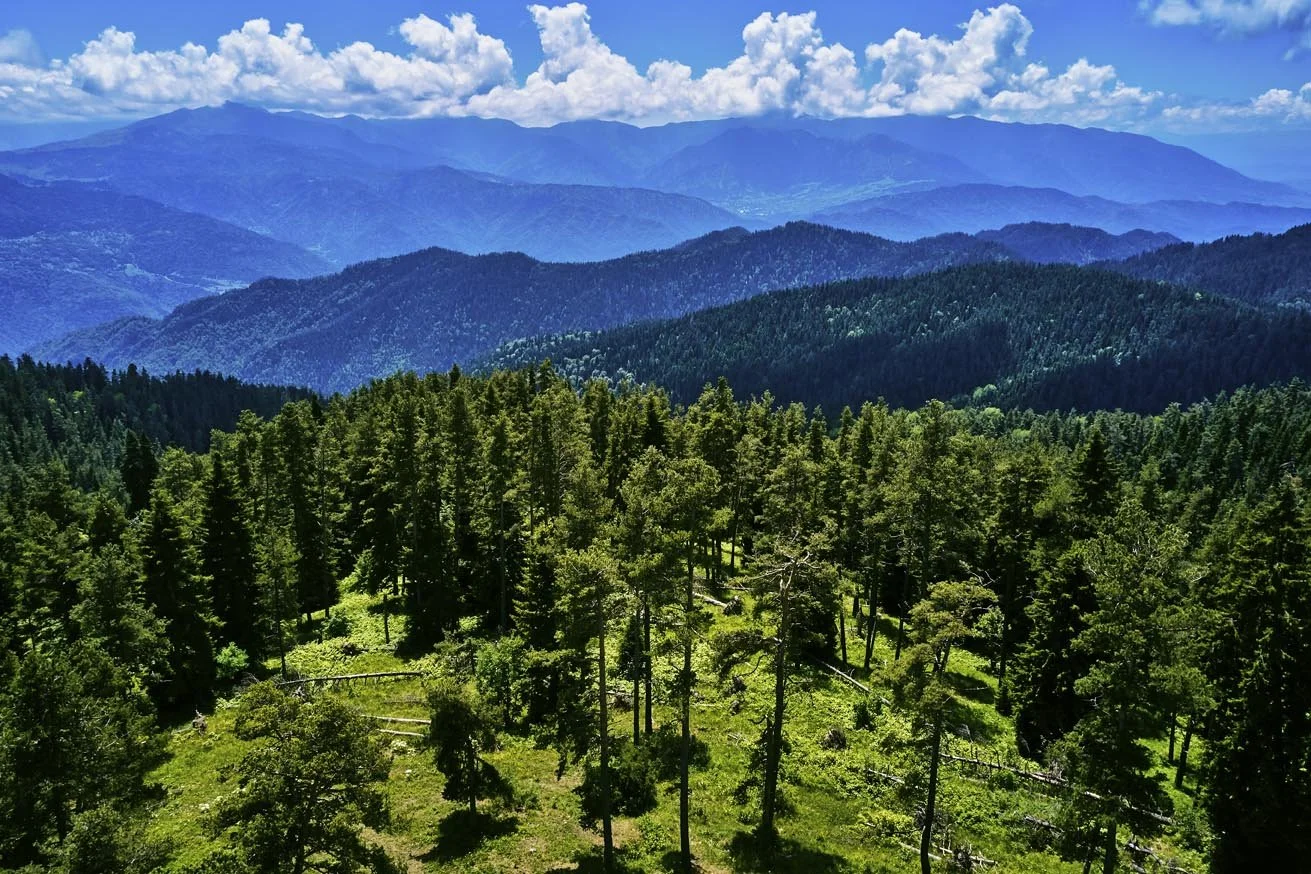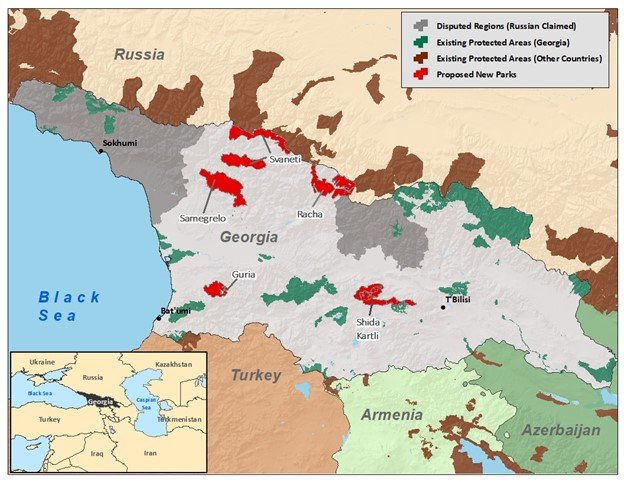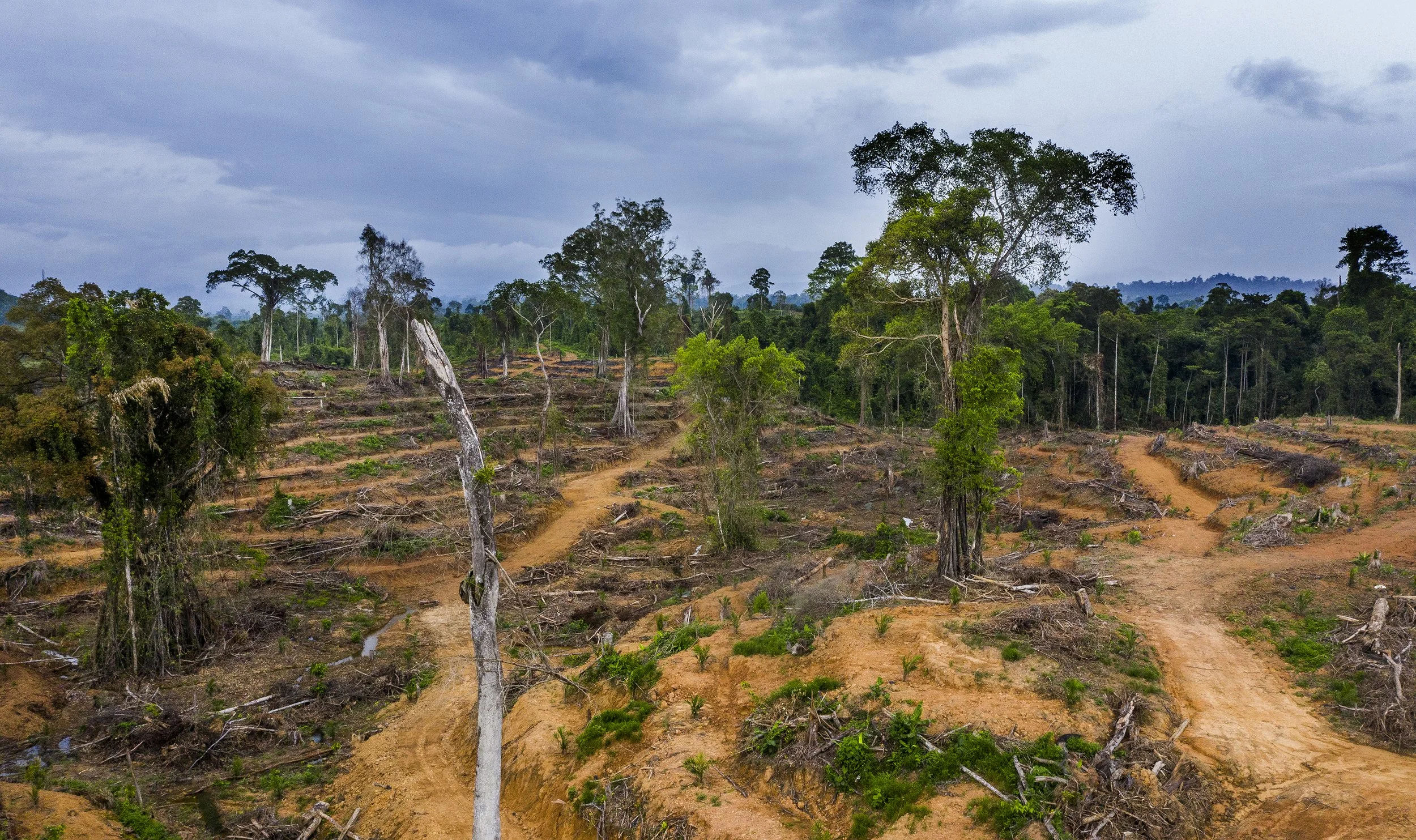Racha National Park, Georgia
OVERVIEW
In the northwestern most stretches of the country of Georgia lies a sparsely populated region called Racha-Lechkhumi. There, Georgia has recently created a new national park, part of a broader initiative to expand Georgia's protected natural areas by 100,000 hectares. This protected area aims to safeguard local biodiversity, promote tourism, and create new jobs in the region.
SIZE
51,000 Hectares
GOAL
$450,000
VISITORS BY 2030
12,000
Introduction
The area is naturally bordered by mountain ranges, including the Shoda-Kedela Ridge and the Lechkhumi Range, which separate the historical regions of Mountain, Upper, and Lower Racha, Lechkhumi, and Lower Svaneti. These are vast, inaccessible stretches of deep forests, alpine meadows that burst into bloom in the spring, and crystal glaciers that feed the rivers that provide fresh water to Georgians.
Starting from the city of Oni, visitors to the park can explore highland villages like Ghebi, Utsera, Chiora, and Glola, encountering breathtaking landscapes, turquoise rivers, wildflowers, and dense forests along the way. The Great Caucasus mountain range serves as a stunning backdrop, making Racha captivating year-round, from vibrant autumns to snowy winters.
Natural Heritage
Racha National Park has immense biodiversity value and is home to many rare and endemic plant and animal species. Some of the species that call this park home are the Tur (a type of mountain goat), brown bear, several red-listed vulture species, and the high mountain oak (Quercus macranthera).
Racha and its surroundings contain 1100 species of plants, including 9 endemic species. Uncontrolled hunting in the area has led to a decline in the number of large mammals, but wolves, lynx, bears, foxes, deer, and a variety of others still roam these mountains.
Planned Projects
Socio-economic programs to support the local community
Small grants for people living in the vicinity of the national park
Training of the local population and strengthening of necessary skills for the production of ecotourism activities
Construction of the national park administration, visitor center buildings, ranger shelters, cottages, picnic and camping areas, footpaths, and informational signage
Photo ©AdobeStock/Ioan Panaite
The newly formed Racha National Park protects one of the most beautiful and inaccessible stretches of Georgia’s Caucasus Mountains.
Threats to Racha National Park
• Unsystematic logging, which affects habitat and watersheds and creates landslides;
• Inappropriate and/or uncontrolled land use (agriculture and tourism);
• Habitat destruction (e.g. through large-scale hydropower infrastructure);
• Uncontrolled resource use (hunting, fishing, mining);
• Uncontrolled use of natural functions (pollution surface and ground water);
• Climate change.
Economic Issues
In the villages, economic activities are predominantly driven by family households, with most residents engaged in farming. Only a few people work in other sectors such as transport, road repair, trade, education, healthcare, tourism, and various services.
Cattle breeding is the primary economic activity, crucial for both household subsistence and generating extra income. However, challenges like low-quality fodder, outdated breeds, and a lack of systematic breeding practices have led to poor milk and meat yields.
A significant issue is the overuse of meadows and pastures for feeding cattle, posing a threat to both the environment and the local community. To ensure environmental sustainability, it's essential to implement a wise resource-use regime, eliminate illegal and uncontrolled resource exploitation, reduce fuelwood consumption, develop ecotourism facilities, and actively involve the local population in managing protected areas.
By deploying Global Park Defense, we will help protect Racha
National Park from further degradation.
Saving Racha National Park
To help protect Racha National Park, we are providing support to the Georgian Government and the Caucasus Nature Fund (CNF) to deploy Global Park Defense, improve ecotourism potential, and reduce illegal exploitation of resources.
Our Objectives:
Secure a stronghold for globally threatened species through countering illegal logging and poaching through enforcement and creating scalable conservation models.
Deploy Global Park Defense, a multi-year method to achieve “No Cut, No Kill” protection and financial sustainability for continued preservation.
Work with local communities and local stakeholders to deploy Community Protection.
Critical Initiatives
SMART Ranger Patrols
Our partners are providing wildlife anti-poaching training, equipment, rations and technical support to Racha National Park rangers to implement SMART patrols and the use of EarthRanger, increasing coverage, accountability and interdictions of illegal activities.
Provide Training
To build capacity and increase the effectiveness of anti-poaching efforts, we are developing a training program to educate park rangers and administrators in park and wildlife protection using modern technologies and systems.
Deployment of Global Park Defense Systems
We are funding critical conservation equipment including cellular trail cams and other technologies to fight illegal logging and poaching, so that Racha’s rangers can undertake regular targeted patrolling based on first-hand evidence and community information.
Partners in Conservation
Additional funding will come from the Georgian Government (APA), Caucasus Nature Fund (CNF) supported by new funds from the Wyss Foundation (Wyss), the US foundation of the Swiss philanthropist Hansjörg Wyss.
Under the agreement, Wyss Foundation will provide funds to CNF to support the initial costs of setting up the new protected areas over a period of five years following their creation. CNF will then on-grant those funds to the Agency of Protected Areas or directly to support the new park.









































